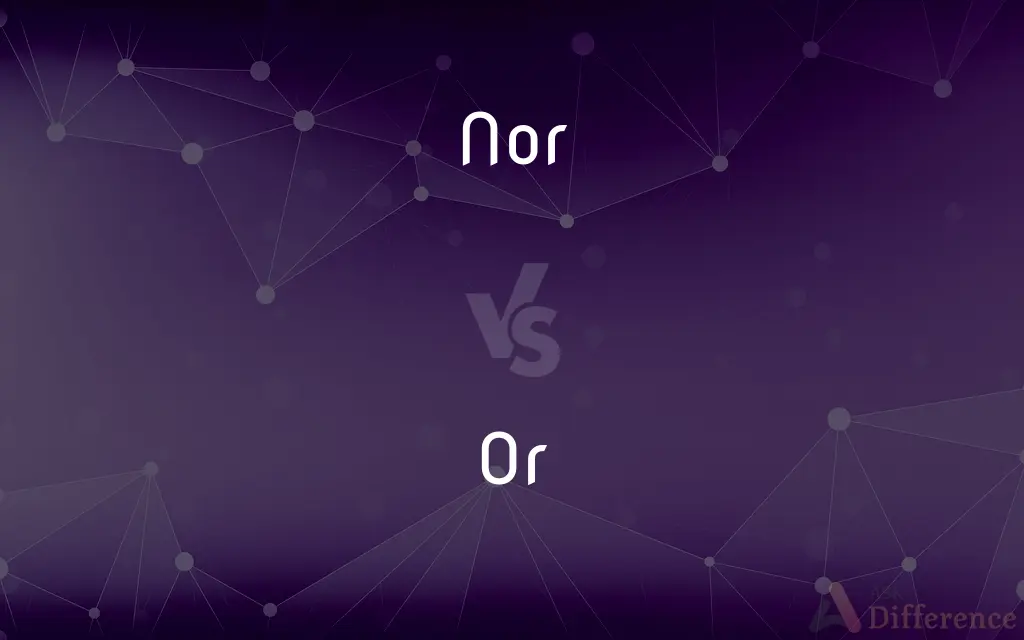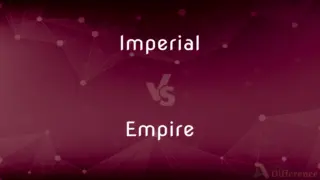Nor vs. Or — What's the Difference?
Edited by Tayyaba Rehman — By Fiza Rafique — Updated on September 25, 2023
"Nor" is a negative coordinating conjunction used to introduce a further negative statement. "Or" presents alternatives or choices. While "or" can stand alone, "nor" often pairs with "neither."

Difference Between Nor and Or
Table of Contents
ADVERTISEMENT
Key Differences
"Nor" and "or" are both coordinating conjunctions used in the English language, but they serve different purposes and contexts. The word "nor" is a negative conjunction used to introduce an additional negative statement. On the other hand, "or" is used to present alternatives or choices between different items or ideas.
In sentences, "nor" typically pairs with "neither" to indicate two negative situations. For instance, "Neither John nor Mary is attending the party." This sentence indicates that both John and Mary won't attend the party. Conversely, "or" provides options: "Would you like tea or coffee?" Here, "or" offers a choice between tea and coffee.
Another notable difference between "nor" and "or" lies in their standalone capabilities. While "or" can comfortably exist in a sentence without a paired word, "nor" often needs "neither" for its complete expression. An "or" sentence might be, "You can choose the red or the blue shirt." However, a sentence with "nor" would likely include "neither," as in, "Neither rain nor snow will stop the mail."
Furthermore, the context and tone surrounding "nor" and "or" differ. Using "nor" typically introduces a more negative tone to a sentence, while "or" remains neutral. "I don't like broccoli or spinach" simply lists preferences. Yet, "I like neither broccoli nor spinach" underscores a strong dislike for both vegetables.
Comparison Chart
Function
Introduces a further negative statement.
Presents alternatives or choices.
ADVERTISEMENT
Pairing
Often pairs with "neither."
Can stand alone.
Tone
Generally negative.
Neutral.
Usage Example
Neither Jane nor John is here.
Do you want cake or ice cream?
Grammatical Requirement
Requires consistent elements (e.g., noun-to-noun).
Less stringent but appreciates consistency.
Compare with Definitions
Nor
Expresses a negative circumstance or option.
I will accept neither the offer nor the responsibility.
Or
Used to indicate a choice or alternative.
Do you prefer chocolate or vanilla?
Nor
Indicates the non-existence of two or more conditions or possibilities.
He neither called nor texted me back.
Or
Suggests the consequence of not following a condition.
Finish your homework, or you can't go out.
Nor
A conjunction indicating two negative situations.
She doesn't like broccoli, nor does she like spinach.
Or
A conjunction linking different possibilities.
I don't know if it's a fruit or a vegetable.
Nor
Used to deny a further thing after words like "neither," "not," or "no."
I have no money, nor do I have time.
Or
Used to indicate an alternative, usually only before the last term of a series
Hot or cold.
This, that, or the other.
Nor
Used to introduce an additional negative statement.
He's neither friendly nor helpful.
Or
Used to indicate the second of two alternatives, the first being preceded by either or whether
Your answer is either ingenious or wrong. I didn't know whether to laugh or cry.
Nor
And not; or not; not either
Has neither phoned nor written us.
Life forms that are neither plants nor animals.
Or
(Archaic) Used to indicate the first of two alternatives, with the force of either or whether.
Nor
Than.
Or
Used to indicate a synonymous or equivalent expression
Acrophobia, or fear of great heights.
Nor
A logical operator that consists of a logical OR followed by a logical NOT and returns a true value only if both operands are false.
Or
Used to indicate uncertainty or indefiniteness
Two or three.
Nor
(literary) And... not (introducing a negative statement, without necessarily following one).
Nor did I stop to think, but ran.
They are happy, nor need we worry.
Or
Before. Followed by ever or ere
"I doubt he will be dead or ere I come" (Shakespeare).
Nor
A function word introducing each except the first term of a series, indicating none of them is true.
I am neither hungry nor thirsty nor tired.
Or
A logical operator that returns a true value if one or both operands are true.
Nor
Used to introduce a further negative statement.
The struggle didn't end, nor was it diminished.
Or
Gold, represented in heraldic engraving by a white field sprinkled with small dots.
Nor
Than.
He's no better nor you.
Or
Before.
Nor
Alternative form of NOR
Or
(logic) An operator denoting the disjunction of two propositions or truth values. There are two forms, the inclusive or and the exclusive or.
Nor
A negative connective or particle, introducing the second member or clause of a negative proposition, following neither, or not, in the first member or clause (as or in affirmative propositions follows either). Nor is also used sometimes in the first member for neither, and sometimes the neither is omitted and implied by the use of nor.
Provide neither gold nor silver, nor brass, in your purses, nor scrip for your journey.
Where neither moth nor rust doth corrupt.
I love him not, nor fear him.
Where neither party is nor true, nor kind.
Simois nor Xanthus shall be wanting there.
Or
Otherwise a consequence of the condition that the previous is false.
It's raining! Come inside or you'll catch a cold!
Or
(tincture) The gold or yellow tincture on a coat of arms.
Or
(tincture) Of gold or yellow tincture on a coat of arms.
Or
(obsolete) Early (on).
Or
(obsolete) Earlier, previously.
Or
Before; ere. Followed by "ever" or "ere".
Or
A particle that marks an alternative; as, you may read or may write, - that is, you may do one of the things at your pleasure, but not both. It corresponds to either. You may ride either to London or to Windsor. It often connects a series of words or propositions, presenting a choice of either; as, he may study law, or medicine, or divinity, or he may enter into trade.
If man's convenience, health,Or safety interfere, his rights and claimsAre paramount.
Maugre thine heed, thou must for indigenceOr steal, or beg, or borrow thy dispence.
Or
Ere; before; sooner than.
But natheless, while I have time and space,Or that I forther in this tale pace.
Or
Yellow or gold color, - represented in drawing or engraving by small dots.
Or
A state in northwestern United States on the Pacific
Or
A room in a hospital equipped for the performance of surgical operations;
Great care is taken to keep the operating rooms aseptic
Or
Used to clarify or rephrase a previous statement.
She is my aunt, or rather, my aunt-in-law.
Or
Indicates an equivalent or synonymous term.
The boat, or vessel, was docked by the pier.
Common Curiosities
Do I always need "neither" with "nor"?
While commonly paired, "nor" can be used without "neither," especially after other negatives.
Which has a more negative tone, "nor" or "or"?
"Nor" typically introduces a more negative tone than "or."
How do I ensure parallelism with "nor"?
Match sentence elements: "Neither the teacher nor the students are at fault."
Is "nor" common in everyday speech?
While correct, "nor" is less common in casual speech compared to formal writing.
Can "or" be used in negative statements?
Yes, e.g., "I don't like broccoli or spinach."
Can "or" suggest consequences?
Yes, e.g., "Complete your tasks, or face consequences."
Can "nor" be used without "neither"?
Yes, but it often emphasizes the negative: "I don't like broccoli, nor do I like spinach."
Can I use "nor" to emphasize a negative sentiment?
Yes, e.g., "He doesn't call, nor does he write."
What's the primary purpose of "or"?
"Or" presents alternatives or choices between items or ideas.
Can "or" indicate a synonymous term?
Yes, e.g., "A boat, or vessel, is docked."
Can "or" stand alone in a sentence?
Yes, "or" can comfortably exist without a paired word, e.g., "Is this your book or hers?"
How do I choose between "nor" and "or"?
Consider context: Use "nor" for additional negative statements and "or" for alternatives or choices.
Which is more formal, "nor" or "or"?
Both are standard in English, but "nor" can sound more formal due to its less frequent use.
Can "or" be used to rephrase something?
Yes, e.g., "He's a doctor, or a medical professional."
Is it correct to say, "I don't like cats nor dogs"?
It's more standard to say, "I don't like cats or dogs" or "I like neither cats nor dogs."
Share Your Discovery

Previous Comparison
Indescribable vs. Ineffable
Next Comparison
Imperial vs. EmpireAuthor Spotlight
Written by
Fiza RafiqueFiza Rafique is a skilled content writer at AskDifference.com, where she meticulously refines and enhances written pieces. Drawing from her vast editorial expertise, Fiza ensures clarity, accuracy, and precision in every article. Passionate about language, she continually seeks to elevate the quality of content for readers worldwide.
Edited by
Tayyaba RehmanTayyaba Rehman is a distinguished writer, currently serving as a primary contributor to askdifference.com. As a researcher in semantics and etymology, Tayyaba's passion for the complexity of languages and their distinctions has found a perfect home on the platform. Tayyaba delves into the intricacies of language, distinguishing between commonly confused words and phrases, thereby providing clarity for readers worldwide.















































